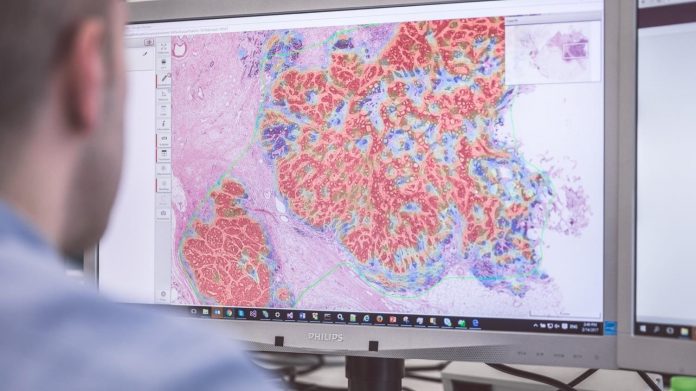
Results from a large international study, performed as part of a competition called PANDA, show that artificial intelligence (AI) algorithms can accurately diagnose and grade prostate cancer.
The researchers who set up the challenge had already produced AI algorithms to detect prostate cancer, but wanted to try and overcome the challenge of the dataset used for training the model differing from the population being tested. The results showed it is possible to generalize across different patient populations, something that has proved problematic in the past.
Prostate cancer is the second most common cancer in men across the world and more than 1 million diagnoses are reported each year. Prognosis varies a lot and while it can be very treatable, it accounts for more than 350,000 deaths a year.
There has been a lot of attention on the use of AI for cancer diagnostics and digital pathology over the last couple of years. While it is rapidly becoming part of standard practice in many places there are still some significant challenges that need to be overcome before widespread adoption is feasible.
“The main challenge with implementing AI in healthcare is to achieve good results across different populations from different hospitals and countries,” Kimmo Kartasalo, a postdoctoral researcher at the Karolinska Institute and first author on the Nature Medicine study describing the work, told Inside Precision Medicine.
“In our study, importantly, the high performance was retained across multiple international patient cohorts. The study demonstrated the efficiency of open sharing of data in the form of a competition as a way of accelerating innovation.”
The Prostate cANcer graDe Assessment (PANDA) Challenge was set up by Kartasalo and colleagues at the Karolinska Institute to incentivize AI developers to produce a highly accurate tool for assessment of prostate cancer.
Overall, 1290 developers joined the challenge, which lasted for 3 months, and worked to produce reliable and reproducible AI algorithms that were able to apply Gleason grading –the system used to score prostate cancer tumors and give patients as accurate a prognosis as possible.
The AI was developed using a large set of 10,616 digitized prostate biopsies. A broad set of algorithms were submitted by developers as part of the challenge. Many of these reached a diagnostic level comparable to that achieved by pathologists when tested on multinational cohorts that were fully blinded to the algorithm developers.
“Now that it has been shown that AI algorithms for this task can successfully generalize across international patient cohorts and samples originating from different hospitals, the next step is to carefully evaluate how to best integrate such algorithms in the clinical workflow, and to measure their effect prospectively in routine use,” says Kartasalo.
“This requires setting up clinical trials. If the results of the trial confirm the benefits of the technology in an everyday setting, we believe widespread use is likely to follow in Sweden and elsewhere.”
In addition to data generalizability, there are some practical steps that need to be achieved to make uptake easier. “Even though more and more pathology labs are going digital, a key hurdle for widespread use of AI is that the majority of pathology laboratories still have not been digitalised. However, we believe that more labs can become encouraged to adopt digital pathology as more evidence of the benefits offered by AI accumulate,” adds Kartasalo.
The researchers emphasize that, at least at present, AI tools are not meant to replace human experts but more to assist them with doing their jobs.
“The idea is not for AI to replace human experts, but rather to function as a safety net to avoid pathologists missing cancer cases and to help in standardizing the assessments. AI can also be an option in those parts of the world that today completely lack pathology expertise,” says Lars Egevad, professor at the Department of Oncology-Pathology at Karolinska Institutet and one of the experts on prostate pathology who co-authored the study.













